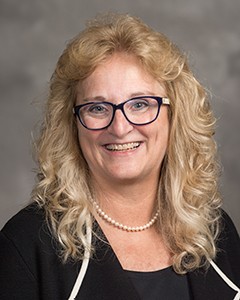Healthcare Innovation Impact Program names new director
Clinical Assistant Professor Rhonda Schoville, Ph.D., MSBA, RN was recently named director of the Healthcare Innovation Impact Program (HiiP) effective June 1. With innovation as its core value, HiiP allows faculty, researchers and nursing students to collaborate and engage imaginatively to share their creations and ideas with others in the healthcare community. Schoville has taught for over 30 years, both formally and informally, at all levels of nursing education covering topics such as health informatics, technology adoption, implementation science, teamwork, patient safety and more. As a teacher and health professional mentor, she uses her prior clinical experience to assist students in their endeavors and is excited to lead the innovation charge through directing the HiiP program.
 “My passion has always been around innovation,” said Schoville. “I think every nurse is an innovator. Nurses innovate every single day. I just don’t think we train our nurses to think about being innovators, but nurses are the ones that know what the patient needs for comfort and satisfaction and much more.”
“My passion has always been around innovation,” said Schoville. “I think every nurse is an innovator. Nurses innovate every single day. I just don’t think we train our nurses to think about being innovators, but nurses are the ones that know what the patient needs for comfort and satisfaction and much more.”
As the leader of HiiP, Schoville aims to build a strong reputation for the University of Michigan as a place for nursing innovation. One of her first orders of business is to formalize a certification for innovation for those faculty who are interested.
“There’s only a few certification programs in the whole country for faculty, so wouldn’t it be nice if we were certified in innovation,” commented Schoville.
HiiP ultimately helps innovators assess and manage a lot of these questions through using an Innovator Pathway. Complete with four phases, the pathway assists creators throughout the lifecycle of their innovation. Phase one starts with idea generation where the problem is addressed and the elements are displayed. Phase two, idea refinement, is where concepts are finalized and prototypes are created. In phase three, innovators review business planning and execution before phase four where they launch and promote the innovation.
Schoville teaches an innovation course at the School of Nursing and starts the class by having her students learn about what type of innovative personality they have. This course sets the groundwork for many students to take their knowledge and skills around innovative thinking and transfer the ideas into new innovations.
“There’s a book I make my students read that talks about the different personalities of innovation and why it’s important to include everyone and work together as a group, whether your innovative personality is more of an engineer or an artist or a researcher making for a better innovation,” explained Schoville.
In thinking about the COVID pandemic, Schoville recognizes how creative nurses were. She shares a story of some nurses who used Amazon Alexa’s in patients’ rooms so they were able to talk with their loved ones during a time when COVID-19 restrictions were high and family members often weren’t allowed in the room.
“Nurses are the people that can elevate that patient experience,” said Schoville. “We can reimagine what the future should be. It’s that nurse that’s with the patient the most and can impact their safety, quality of care and ultimately outcome and they can do this through innovation.”
To contact HiiP with an idea or new innovation, email Dr. Schoville, Adjunct Clinical Instructor Margaret Calarco, Ph.D., RN, NEA-BC, Innovation Portfolio and Engagement Specialist Ann Fitzsimons or Assistant Professor Michelle Munro-Kramer, Ph.D., CNM, FNP-BC.





